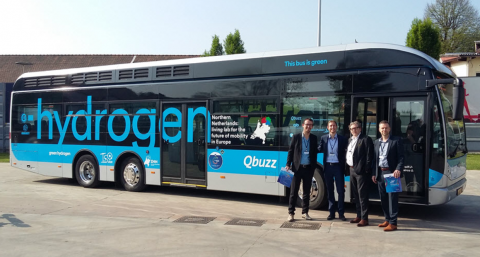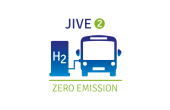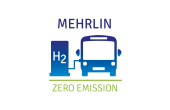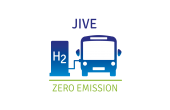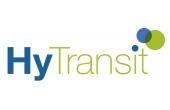Next step in use of green hydrogen for transport
OV-bureau Groningen Drenthe awards the tender for green hydrogen to Shell Nederland. Shell will build a Hydrogen Refuelling Station (HRS) at the Peizerweg bus depot in Groningen. At the same time Qbuzz orders 20 fuel cell buses with the Belgium based bus company Van Hool. The project is supported at European level by the Fuel Cells and Hydrogen Joint Undertaking as part of the JIVE2 project.
Shell will provide between 110-160 tons of green hydrogen per year and Van Hool will provide 20 fuel cell buses. This 20-bus project means hydrogen is becoming a significant part of the energy transition strategy for public transport in the north of the Netherlands. The buses and HRS are planned to be in operation by December 2020.
The fuel cell buses offer a range of 350-400 km. Hydrogen is converted on-board to electricity to power the electric motors. Fuel cell buses offer a bigger range than battery-electric buses which makes them suitable for long-range regional bus routes.
Fleur Gräper - van Koolwijk, regional minister for the Province of Groningen and chairwoman of the Public Transport Authority OV-bureau said: ‘This is a big step for us. Hydrogen is no longer an experimental fuel, but has become a serious zero-emission drivetrain used in every day public transportation. We are proud to implement hydrogen at this scale in the north of the Netherlands and to be a frontrunner in the Netherlands and Europe. It emphasizes the new energy-future we see for the North of the Netherlands.’
Two fuel cell buses, also built by Van Hool, have been running in regular operation since December 2017 already. In this pilot project hydrogen comes as a by-product from the chlorine factory of Nouryon in Delfzijl.
The new buses will be lighter and more economical. Despite the rapid development of hydrogen as a fuel, running costs are still higher. The two buses in Delfzijl and the 20 buses in Groningen are supported by the province of Groningen, the ministry of infrastructure and water management and the EU within the Fuel Cell Hydrogen Joint Undertaking (FCHJU) as part of the High-V.LO City and the JIVE2 projects.
Notes:
-
This project has received funding from the Fuel Cells and Hydrogen 2 Joint Undertaking under grant agreement No 779563. This Joint Undertaking receives support from the European Union’s Horizon 2020 research and innovation programme, Hydrogen Europe Industry and Hydrogen Europe Research.
-
About the FCH JU: The Fuel Cells and Hydrogen Joint Undertaking (FCH JU) is a unique public private partnership supporting research, technological development and demonstration (RTD) activities in fuel cell and hydrogen energy technologies in Europe. Its aim is to accelerate the market introduction of these technologies, realising their potential as an instrument in achieving a carbon-lean energy system. The three members of the FCH JU are the European Commission, fuel cell and hydrogen industries represented by Hydrogen Europe and the research community represented by the research grouping Hydrogen Europe Research.
-
About JIVE2: The JIVE 2 (Joint Initiative for hydrogen Vehicles across Europe) project seeks to deploy 152 new zero emission fuel cell buses and associated refuelling infrastructure across 14 European cities throughout France, Germany, Iceland, Norway, Sweden, the Netherlands and the UK. JIVE 2 will run for six years from January 2018 and is co-funded by a 25 million euro grant from the FCH JU (Fuel Cells and Hydrogen Joint Undertaking) under the European Union Horizon 2020 framework programme for research and innovation. The project consortium comprises 23 partners from nine countries. The JIVE2 project is an expansion of the JIVE project which is now entering its second year of activity. Combined, the JIVE projects will deploy nearly 300 fuel cell buses in 22 cities across Europe by the early 2020

